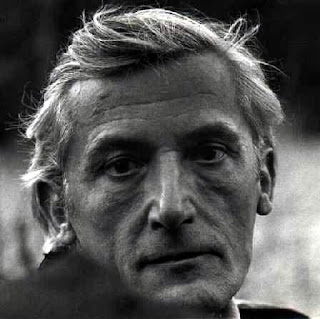Friday, 16 July 2010
János Pilinszky - 'The Desert of Love'
One of the greatest Hungarian poets of the 20th Century was the Catholic, János Pilinszky. Fortunately for us, some of his poems have been translated by Ted Hughes and János Csokits and published in a collection entitled The Desert of Love.
Pilinszky's life and work was largely shaped by his experiences at the end of World War II when, having been drafted into the Hungarian army, he experienced some of the horrors of the Nazi death camps. His early poetry, in particular, draws upon those shattering experiences and so it is perhaps no surprise that the silence of God is often more apparent in them than faith, hope or love. Nonetheless, Pilinszky was never a nihilist, as even terribly bleak poems like 'Fish in the Net' reveal.
A fair amount of Pilinszky's poetry is available on the web, including the haunting 'Fable' which is worth revealing line by line to maximise its potential to shock, 'The French Prisoner', which is available in at least two different translations, and 'Introitus'. However, there are also other poems, such as 'The Passion', 'Enough', and 'Exhortation' which are less readily available but which are well worth seeking out.
The Desert of Love has an excellent and highly sympathetic introduction by Ted Hughes. The only major omission is any direct reference to the horrendous political situation in Hungary during the late '40s and '50s. And yet poems like 'Introitus' can really only be understood in their political context. This is where books like George Paloczi-Horvath's The Undefeated come into their own. Paloczi-Horvath gives an extremely well-written and powerful account of those terrible years and helps us to understand why Pilinszky fell silent for so long after the success of his first collection.
Introducing Hungarian poetry into the classroom might seem a tall order but, as John Clegg of Durham University has shown, Pilinszky's poems are not only valuable in their own right but can also shed light on Ted Hughes's work. Pilinszky's poetry could also be studied alongside that of his fellow Central European and classroom favourite, Miroslav Holub, but essentially his poetry needs no excuse. It is powerful stuff and deserves to be more widely known.
Subscribe to:
Post Comments (Atom)


No comments:
Post a Comment